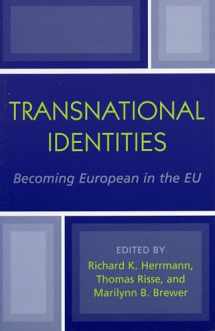
Transnational Identities: Becoming European in the EU (Governance in Europe Series)
Book details
Summary
Description
This original work explores the increasingly important phenomenon of the formation of transnational identity. Considering the ongoing relevance of the European Union, the contributors ask a series of intriguing questions: Is a European identity possible? How are the various types of European identity formed and maintained? How are these identities linked to the process of European integration? Combining a rich array of theoretical and methodological perspectives, distinguished scholars examine both the theoretical understanding of why and how transnational identities form and new empirical evidence drawn from an impressive body of primary research, including field experiments, in-depth interviews with elites, and public opinion surveys. The authors engage in a fruitful dialogue about how much a European identity exists and how much it matters as they delve into the sources of disagreement and their implications.


We would LOVE it if you could help us and other readers by reviewing the book
Book review



